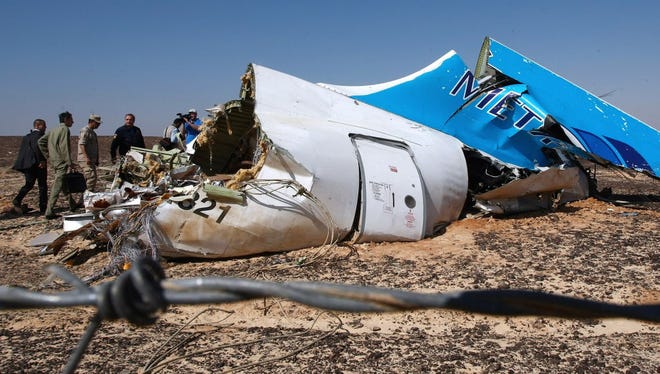Egypt moves to beef up airport security
Amid tourism and safety issues clouding Egypt's air system, a British firm will suggest ways to beef up security at Cairo and Sharm el-Sheikh airports in the wake of a mysterious Russian Metrojet crash in Sinai.

The Egyptian government hired Control Risks, a security company, to make recommendations about airport security despite the lack of conclusion about what brought down the Russian plane Oct. 31 with 224 people aboard.
Russians investigators have blamed a small bomb, while the Egyptian team leader said all options remain open, including sabotage. But Russian, British and other airlines stopped flying to Sharm el-Sheikh out of security concerns, which hurt the popular tourist destination.
"The fact that the UK and Russia decided not to fly into Sharm el-Sheikh affected a lot of businesses and cast a shadow overall on the destination and, accordingly, we lost consumer confidence," Hisham Zaazou, the minister for tourism, told USA TODAY. "That affected us tremendously, I have to admit. That’s why we’re trying to change course and move in a better direction.”
Rather than focus on the crash, Zaazou said Control Risks was hired to deal with the higher threat level worldwide, after the attacks in Paris killed 130 people on Nov. 13 and shootings at a holiday party in San Bernardino, Calif., killed 14 on Dec. 2.
"We look forward to achieve the gold standard in our airports, changing the current crisis into an opportunity and moving into better waters in that respect," Zaazou told USA TODAY. "Egypt is trying to meet a higher standard of security in its airports, for its citizens and its guests."
Egyptian tourism still hasn't recovered to levels before the January 2011 revolution that overthrew former President Hosni Mubarak, according to a report Tuesday from the Regional Center for Strategic Studies in Cairo. But the government's quick response with promotional campaigns, political and financial assistance, such as delaying insurance payments on hotels for three months, to reduce the impact of the crisis, according to the report.
"After the downing of the Russian aircraft, official sources predicted that there will be huge losses in the tourism sector in light of the negative messages coming from foreign sources stating that tourist destinations in Egypt are unsafe," the report said. "Overall, the crisis revealed the desperate need to review the diversity and quality of tourist products and locations and, most importantly, a need to support the institutions that are working in this sector."
For the year ending June 30, tourism brought 10.2 million people to Egypt and generated $7.5 billion in income, according to the center. But those totals were 26% and 36%, respectively, less than totals for the year that ended June 30, 2010. Tourism has fallen off worse since then.
"The departure of British and Russian tourists together from the city in Sharm el-Sheikh was quite harmful to the industry as British and Russian tourists represent two-thirds of the touristic movements in the city of Sharm el-Sheikh," the report said.
U.K.: Bomb may have brought down Russian jet
After the Metrojet crash, the U.S. Department of Homeland Security sent officials to airports "in the region" to make suggestions about how to thwart terrorists. Airports that send flights directly to the U.S. must meet standards set by the Transportation Security Administration, but others such as Sharm el-Sheikh might not.
Jeh Johnson, secretary of Homeland Security, said the enhancements included additional screening for items put on planes, airport assessments in conjunction with counterparts in other countries and offers of other assistance that are both seen and unseen.
Zaazou said security delegations from the United Kingdom, Russia, Germany and elsewhere have provided recommendations and worked cooperatively. He hopes the steps Egypt is taking will reassure tourists from America and elsewhere to start visiting his country again, and that British and Russian flights resume soon.
"We started implementing them on ground, to ensure that we have up to date systems in that respect, particularly comforting our partners that we’re taking things very seriously," Zaazou told USA TODAY. ""We would like to ensure that the flow of tourism to Egypt be maintained and continued."
U.S. urges security enhancements at foreign airports
Hossam Kamal, minister of civil aviation, said all Egyptian airports must apply international standards.
"These measures are audited regularly by the Egyptian Civil Aviation Authority, international organizations and bilateral audit teams, yet we will go every extra mile to increase the level of confidence in our security procedures," Kamal said.
Control Risks will also cooperate with the international delegations from a number of countries – including the United Kingdom, Germany and Russia – who have been working with the Egyptian government to make substantive recommendations about airport security.
"At a time of heightened global security concerns, the Egyptian Government is appropriately reviewing airport security," said Andreas Carleton-Smith, CEO of Control Risks for the Middle East and Africa. "As part of this exercise, Control Risks has been appointed to review existing security processes and procedures at a number of key Egyptian airports."